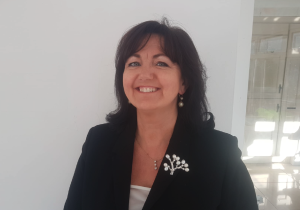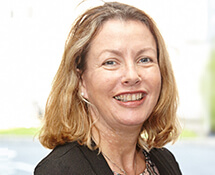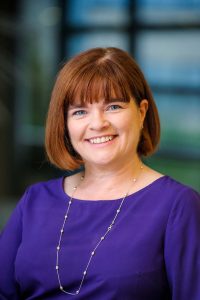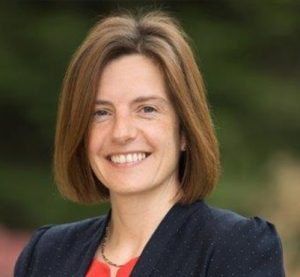Four HMI Council Members, all in leadership positions in the Irish health services, debate “Women in Leadership,” in a special podcast to celebrate the HMI’s 75th Anniversary. HMI Council Member and Hon. Editor of Health Manager, Caroline O’Regan moderates the discussion.

Welcome to this podcast this evening in celebration of the HMI 75th Anniversary. The ‘Elevate Report’ from Business in the Community Ireland, published a few weeks ago, found 38% female representation at senior executive roles, higher than the national average of 30%. It would be interesting to have figures for the Irish health services. In the meantime, I am delighted to be joined by such a distinguished panel of speakers this evening, to debate the vital topic of women in leadership.

You have to take the opportunities, you have to take the risks ….
My pathway has been quite varied, but it has been a fabulous time and it’s a great time for women, in particular…..

Being a CEO or senior leader in health can be a lonely place and the HMI is a safe space to share and get people’s opinions…….

And again, you know, it’s down to the remarkable people that you meet in your career…….
Transcript from live podcast.
Caroline O’Regan
Welcome to this podcast this evening in celebration of the HMI 75th Anniversary. The topic is women in leadership and we are extremely privileged to welcome our panel of speakers this evening. They are all women in leadership positions and all part of the HMI Council.
I am going to ask each panel member the same question:
Q: Could just tell us a little bit about you? How did you get to where you are today in terms of your leadership role with the Health Services and your role in HMI. Thank you.
Anne Slattery
I started out with a clinical background very similar maybe to some other managers in the Irish health service.
My initial training, would have been at St. Vincent’s hospital in Dublin and the Coombe Hospital.
Originally, I hadn’t thought about leadership. At a young age, I don’t think anybody starts to think about leadership. When I finished my midwifery, there was a high unemployment rate in Ireland and the opportunities were actually limited for nurses. I don’t know if anybody remembers back then, but in the ‘80s recession it probably was the first time that nurses were actually unemployed, so it gave me an opportunity in that, at that time there were opportunities opening up abroad.After my midwifery, I went to America for two years, and that was the first time that I got to see possibly another side of healthcare. Developments in quality really opened my eyes and I also worked with some very inspirational leaders in terms of Ward managers and it was very different to Ireland. Then I came back and I returned to nursing. I decided that I certainly wasn’t going to stay at nursing for the rest of my life and I was going to move on.
I was very fortunate, there were opportunities coming up because at that time in the early ‘90s, there were big waiting lists in hospitals and there were ED trolleys emerging. This hadn’t been spoken that much before then, but they certainly had beds on corridors and extra beds on wards.
I was very lucky. I applied for a job, I didn’t know too much about it, but it was in the acute hospitals office in the South-Eastern Health Board at the time, and it was probably my best education and commenced the journey to my future role in management.
During that time I was very fortunate. I pursued my studies in leadership/ management, I did the MBA. and also I was in a centre where I could actually apply for projects, and I think it’s very important that people watch out for such opportunities. I was working with waiting lists, ED trolleys, but one of the major things that happened in the southeast was the centralization of orthopaedic trauma. It was very difficult at the time and very political. I was working in an office with an inspirational leader, a Pat McLaughlin. He certainly was very supportive and I think that probably sent me on the management career trajectory.
After a number of years working in the acute hospitals office, I decided, I wanted to get out where the action was and I worked in some of the hospitals in the south east in a senior manager role. I worked in Wexford, with a very good experienced manager, Teresa Hanrahan. I also was fortunate to work in a public health department, coordinator for services as older people and coordinator for the cardiovascular strategy implementation, before taking up my current role here in Kilkenny. Again, you go for the opportunities that are there. I have been hospital manager in St Luke’s General Hospital for over 20 years and there has been much development on the site during this time.
The pandemic probably was the biggest eye opener of all. The sense of urgency for change really rang home. I got more done during the pandemic in terms of infrastructure and building than in the previous years, and I would say it was the same for many leaders and managers. You have to take opportunities and you have to take risks. I would agree that if you have good mentors, go for the opportunities that present. You can’t be looking at things too much in depth just take on the opportunities and make the most of them.
Caroline O’Regan
Q: Where did the HMI come in ?
Anne Slattery
That’s very interesting. As managers it’s a small group in Ireland but I happened to know some of the managers and, in particular, Gerry O’Dwyer. I came into the Council as Secretary. Lucy Nugent was Hon. Secretary before me, and again it was an opportunity when asked to become Secretary. I had done a diploma in corporate governance, so it would have tied in in terms of the experience that one might need when you’re working for a charitable organization that’s a limited company also. It would fit in nicely with what I wanted to do in terms of corporate governance. It is really important that you know you can network, you can discuss problems, maybe outside of the structures that are in the workplace. Certainly, maybe at the coffee table, you can get a lot more done and a lot more learning, than you would, maybe in a structured environment, so the HMI has been very inspirational, and again I think the European links are very good. Also, the regional meetings, even though during the pandemic, meetings were limited. There is a very good structure in place, and for any manager, people do need experience to look up to and to help them a little bit with their career progression and be able to hone in on those aspects that may get you a little bit further. I suppose very interestingly at the weekend, we’re talking about women in leadership and maybe not doing some of those tasks that get you nowhere. I’m sure you probably all heard, there was a programme where they were saying cut out all of that, just go straight to the top. But sometimes you do have to do tasks in order, maybe to learn a bit more about the organization.
Breda Crehan Roche
I started as a nurse and trained as a nurse and I specialized in the whole area of intellectual disability. Soon afterwards I went into management and, I was very interested in quality and standards. I would have also worked in quality, with intellectual disability and brought an organization through the ISO and Q Mark Accreditation. I completed an MSc in Economics and Management of Healthcare, and that was really fantastic and opened a huge area to me outside of just the disability area. I joined the Midland Health Board in 1996 and Dennis Doherty was CEO at the time, he would have been very instrumental in mentoring me. During that time I completed an MBS specialising in project management. In the Midland Health Board I had various roles in management as Director of Disability Services culminating in Assistant CEO in Community Care as it was at the time.
In 2005 I applied for a number of jobs. I did get an Assistant National Director in HSE but I also always wanted to be a CEO and I was seconded from the HSE Midland Health Board to what was Galway County Association which has changed its name to Ability West. I was CEO there for a number of years and that’s when Denis Doherty would have said to me, “Look, would you like to get involved in HMI,” so I started to get involved with HMI in 2005.And I’ve been on the Council, for many years. I saw the wealth of experience that people had shared from HMI, and the range of management training offered by HMI, which was fantastic.
I came back into the HSE again as Chief Officer of Community Healthcare West in 2020, as COVID 19 and the cyber attack My career has been quite varied, but it has been a fabulous time and its a great time now for women in particular, especially with the advent of the RHAs.
Lucy Nugent
Thanks very much Caroline. So, there is definitely a theme emerging here, because I also started my career in the health service as a nurse. And I think Sharon, who follows me also did, so there Is something to be said for nurses. Which is great because 75% of the workforce, you know, are women and the majority of them are actually nurses, so it is great to see nurses going into leadership positions.
So, I trained originally as a registered children’s nurse in Temple Street, and as a registered general nurse in St Vincent’s Elm Park and I have to say I particularly enjoyed my nursing years. I feel they very much set me up for my future career in health. I was a Clinical Nurse Specialist and very happy, but unfortunately the Consultant, I was working with moved to another hospital and my job was such it was temporarily paused. I had been doing my Bachelor of Nursing Studies, which was part of the Commission of Nursing supporting nurses back into education. And a job was advertised in Temple Street for an operations role and I threw my hat in the ring really to get experience of doing an interview. I hadn’t done one for many years. I never really thought I would get it. Paul Cunniffe was the CEO at the time. He saw something in me that I didn’t see, gave me the job and was very supportive in those formative years.
So, I moved away from nursing into management, which was probably quite an unsettling time because nursing is a great support network and it’s quite hierarchical and everyone knows where they are within that structure. So, again, I found that probably one of the most challenging changes in my career. I spent many years in Temple Street and got great support. Mona Baker, who succeeded Paul was very supportive in the work I did, both with HMI and laterally with the European Association of Hospital Managers. So again, it was a period of growth. I did my Masters in Health Management at Trinity. That was a great opportunity to put theory against the practice, and again I think there is a similar thread. I think we’re all lifelong learners and in health, that’s really, really important, to keep that inquiring mind fuelled.
I then I worked for a period in the private sector, which was again interesting. Look, healthcare is healthcare but there is a slightly different focus in the private sector as well, which is an interesting experience. I moved into the Health Service Executive Hospitals Division, as Head of Quality and Safety for a short period of time, before coming to Tallaght University Hospital, as the Chief Operations Officer. Two years later I became the Deputy CEO and two years later, in 2019 I became CEO, which is the position I still hold today.
And in relation to HMI, Ned Byrne was the Honorary Secretary of the HMI
for the guts of, I think, 30 years and he finally trusted someone else to whom he could hand over the mantle. And so, again I had met Ned at a couple of the European conferences and a couple of the HMI Conferences, so he and Gerry O’Dwyer approached me and I took on that position. And again, I learned an awful lot about the workings of the HMI and really it is about who you know, involving education, networking and supporting health managers. It is the only professional association of hospital managers and you know the professionalism of health management is something to which we don’t give enough attention. For example, in France and Portugal, you actually have to do a specific course to become a Health Manager and it’s great support for the career structures. We don’t have that same thing here in Ireland. I think it’s something we need to look at developing. I became the Vice President of the Institute and then the President of the Institute in 2014. And again, that was a great honour. I think again, it comes with responsibility, because you are representing your country on things like the Executive of the European Association of Hospital Managers it’s a great opportunity to promote Ireland. You know we tend to think that we, maybe we aren’t as advanced or as progressive as other countries, but you know we are up there, and I think we should have some confidence in where we stand in Europe and, as I said previously, I do believe in the competency of health managers. So, I was privileged to represent the European Association on a global consortium, the International Hospital Federation for the development of healthcare management, leadership and management competencies. Really, they are skill sets from, kind of novice to master that you can look to develop to support your career and thar’s been rolled out across the world, actually. And that was again a really interesting experience, because you see the likes of some of the developing countries who really have no supports in place for health managers to the likes of the United States where it is very well established. There is an American College of Healthcare Managers that is very well structured, so I found that a really interesting experience. As recently as last week, I had a great honour. I was somewhat humbled to be elected as the next President of the European Association of Hospital Managers. It consists of 28 different Healthcare associations across 26 countries across Europe and I’m proud to say I’m the first female President in their 50 years. But I wouldn’t have got to this stage, I think, in my career without the support of lots of people along the way. I think we have a duty and a responsibility to encourage people along their career trajectory and it’s only when I look back, I see how I was supported, consciously or unconsciously by people, and I think the HMI is a great support network in that regard. Certainly when you get to the level of being a CEO or senior leader in health, it can be a lonely place and the HMI is a safe
space to share and to get people’s opinions and also it has that focus on education. The regional seminars and webinars during COVID were fantastic, because obviously we couldn’t meet face to face and it still kept, I suppose, connectivity going, so I think that’s it in a nutshell.
Sharon Morrow
Thanks Caroline and well done again to Lucy. Like Lucy, I trained professionally as a Nurse a long time ago and in the Adelaide Hospital when it was still there and in the City Centre. I stayed with the Adelaide until we moved out to Tallaght University Hospital, along with the Meath Hospital and The Children’s Hospital in Harcourt Street. I had a number of different nursing positions in Tallaght University Hospital, and at one stage I was Nurse Practice Development Coordinator.
When I was having coffee, I happened to be sitting beside the then Director of Nursing, the wonderful Emily Logan. I said to her that I had had my fill of writing policies and nurse practice development and I really needed a change. At the time I had started my MBA and Emily said. ‘Well why don’t we try to put you in a position where you get to use what you’re learning.’ While they are commonplace now, in those days, there were no business managers, and I was asked if I would pilot the Business Manager position in Tallaght. My claim to fame is that I was the first Business Manager in Tallaght and they asked me to go to the day ward and Endoscopy. There were a few issues there and a common problem many hospitals were having was to open the day word overnight for ED patients, and then it disrupted schedules and theatre allocations. So, my job was to try and put the schedules right. The then CEO in Tallaght , Michael Lyons, told me I wouldn’t get any more promotions in Tallaght until I left and worked outside the hospital and that I needed to go somewhere else and to learn how they did things elsewhere and that led me to go down the road to St James’s.
I worked as a Business Manager in one of the Directorates and that was a very interesting. And I learned a lot. There were 11 specialties in that Directorate and it was the first time I had worked very closely with a Clinical Director. There was also an Assistant Director of Nursing and myself, so, as you can imagine, there were days when there was a little bit of tension between myself and the Assistant Director of Nursing, me being a former nurse and thinking that I knew better! I learned a lot as to how you work together as a team with a common purpose and a common set of values and a common vision.
And again, you know, It’s down to the remarkable people that you meet in your career. I happened to have a coffee, one day, with a very interesting consultant by the name of Barry White, who said he had this great vision for these national programmes in the HSE and he was looking for Programme Managers. Now there are quite a lot of Programme Managers, but at the time, when we started, there were only three of us. It was a fantastic time because everything was so new, no one really knew what was expected of these Programmes, we were trying to put teams together, we were developing new Models of Care and business cases to support them. We got funding for some of it and we managed to implement change. In those days it was really innovative Nothing was off the table.
I enjoyed my time in there and then I decided it was time I got myself back into the acute sector again and I went back to where I knew best, back to Tallaght Hospital. I worked there for a while, before deciding to go to a sector that I hadn’t really worked in. I moved to LauraLynn Children’s Hospice, as CEO. The charity sector is highly regulated, there was a lot of compliance, I obviously had never been as involved in fundraising. There was marketing, profile management, dealing with sponsors, donors and families and all that comes with this. And then the same time in LauraLynn, we also had the Children’ Sunshine Home, a Section 38 intellectual disability respite centre for children, with residential care, so there was a lot going on and in a fairly small organisation. There was a lot required of the CEO, because it is a small organisation. You’re a lot of things to a lot of people.
From LauraLynn, I moved into my current role as Director of the All Ireland Congenital Heart Disease Network, which brings me all over the country, including both jurisdictions, so I get an insight as to how business is done and health care is delivered in both and it’s very interesting to make comparisons culturally, from a management point of view and from a leadership point of view as to how both jurisdictions do their business.
In relation to HMI, I have Lucy again to thank. She was the one who recommended that I join. Then I started off organising the regional meetings and more recently, she asked me if I would consider stepping on to the scientific subcommittee of the EAHM, which is why I was with her last week. It’s a very busy subcommittee and as Lucy has said it gives you a network of people who speak your language and know European healthcare and what it’s like to be a manager. it is very important to have somewhere like the HMI, where you can just share your experience with others and realise it’s not just you, there are others who have the same experiences and have similar challenges. I find it is a huge resource which I can tap into.
Caroline O’Regan
Thanks so much for that Sharon yet another very dynamic leader with lots of firsts in your career roles and work to-date. Also your work on the scientific community has been great especially given that Ireland was in receipt of a number of awards this year under your guidance – so thank you and very well done.
Thank you to everyone. It has been very fascinating privilege to listen to all your stories with so many similarities.

